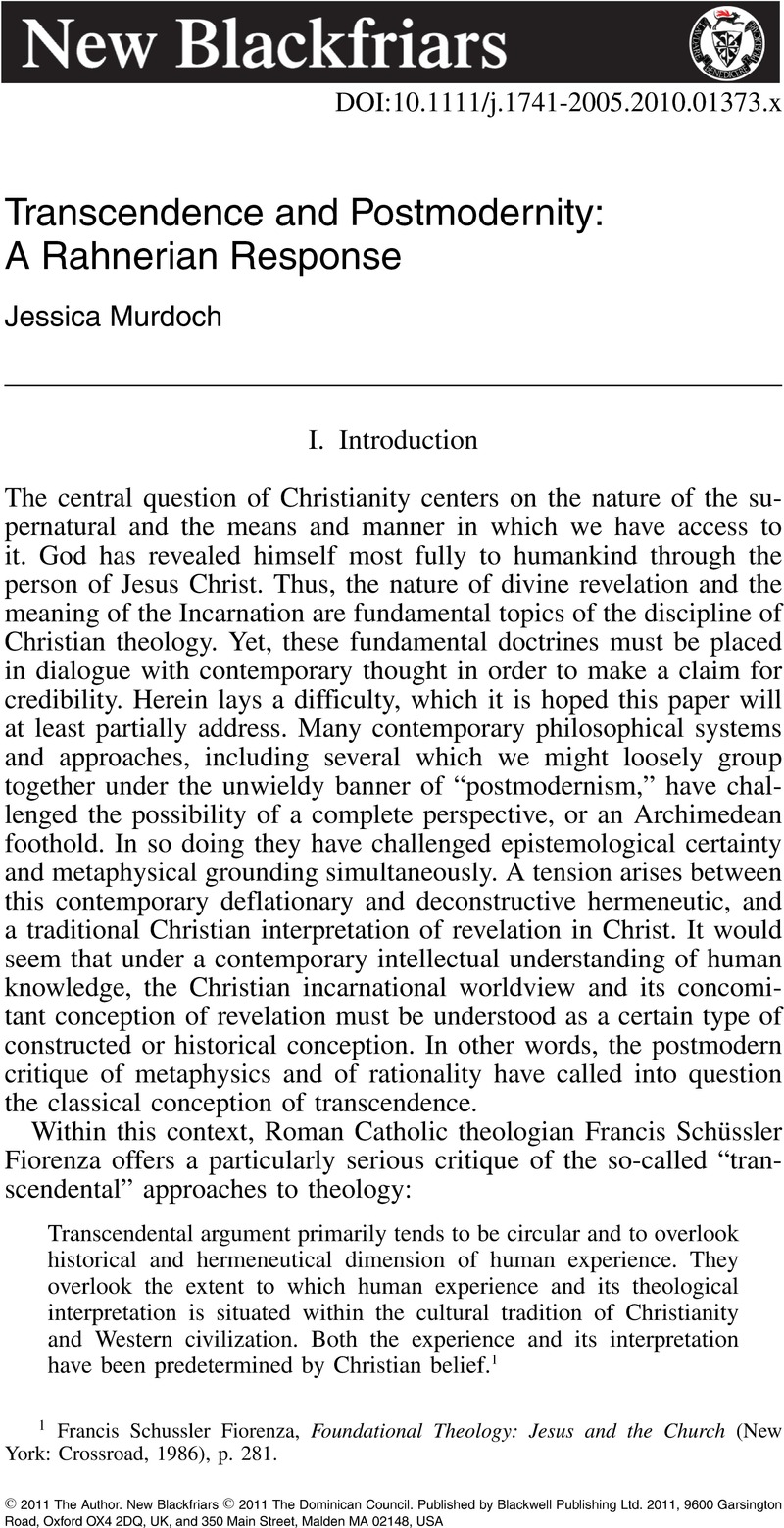No CrossRef data available.
Article contents
Transcendence and Postmodernity: A Rahnerian Response
Published online by Cambridge University Press: 01 January 2024
Abstract

Information
- Type
- Original Articles
- Information
- Copyright
- Copyright © 2011 The Author. New Blackfriars
References
1 Fiorenza, Francis Schussler, Foundational Theology: Jesus and the Church (New York: Crossroad, 1986), p. 281Google Scholar.
2 Lyotard, Jean Francois, The Postmodern Condition: A Report on Knowledge, trans. Bennington, Geoff, Massumi, Brian, and Durand, Regis (Minneapolis: University of Minneapolis Press, 1984), p. 82Google Scholar.
3 Hegel, , Philosophy of Right, trans. Knox, T.M. (New York: Oxford University Press, 1967), pp. 3, 10–13Google Scholar.
4 Cf. Lyotard, The Postmodern Condition, pp. 71–82; Habermas, Jurgen, “Modernity: An Unfinished Project,” Habermas and the Unfinished Project of Modernity, ed. D’Entreves, M.P. and Benhabib, Seyla (Cambridge: Polity Press, 1996)Google Scholar; Barthes, Roland, Image-Music-Text, trans. Heath, Stephen (New York: Hill and Wang, 1978)Google Scholar.
5 Nietzsche, Friedrich, Beyond Good and Evil: Prelude to a Philosophy of the Future, trans. Hollingdale, R.J. (New York: Penguin Books, 1990), pp. 45–46Google Scholar.
6 Nietzsche, , Ecce Homo: How One Becomes What One Is, trans. Hollingdale, R.J. (New York: Penguin Books, 1992), p. 104Google Scholar.
7 Nietzsche, Beyond Good and Evil, p. 34.
8 Ibid., p. 35.
9 Ibid., p. 32.
10 “Who really is it that here questions us? What really is it in is that wants ‘the truth?’” Ibid., p. 33.
11 Ibid., pp. 44–45.
12 Ibid., pp. 64–65.
13 Ibid., pp. 35,45,50. This is undertaken specifically in terms of a critique of the concept of the causa sui. Nietzsche alternately calls this concept a “fiction,”“absurd,” and “logical rape.”
14 Nietzsche, Beyond Good and Evil, p. 67.
15 Ibid., p. 44.
16 Heidegger, Martin, On Time and Being, trans. Staumbaugh, Joan (New York: Harper and Row, 1972), p. 8Google Scholar.
17 Ibid.
18 Ibid., pp. 8–11.
19 Ibid., p. 12.
20 Ibid., p. 15.
21 Derrida, , Of Grammatology, corrected ed., trans. Spivak, Gayatri Chakravorty (Baltimore: Johns Hopkins University Press, 1997), p. 43Google Scholar.
22 Ibid., p. 11.
23 Ibid., p. 18ff.
24 Ibid., pp. 33–34.
25 Ibid., p. 44ff.
26 Saussure, Ferdinand de, Course in General Linguistics, trans. Harris, Roy (La Salle, Illinois: Open Court, 1986), pp. 67–69Google Scholar.
27 Cf. Magliola, Robert, Derrida on the Mend (West Lafayette, Indiana: Purdue University Press, 1984), p. 9Google Scholar.
28 Ibid., p. 11.
29 Ibid., p. 6.
30 Saussure, Course in General Linguistics, p. 114.
31 Derrida, Of Grammatology, p. 63.
32 Magliola, Derrida on the Mend, p. 22.
33 Derrida, Of Grammatology, p. 61. Cf. Magliola, Derrida on the Mend, p. 30.
34 Derrida, Of Grammatology, p. 70.
35 Rahner, Karl, Grundkurs des Glaubens: Einführung in den Begriff des Christentums (Freiburg: Herder, 1984), p. 31Google Scholar.
36 Ibid., p. 31–32.
37 Rahner, Karl, Hörer des Wortes: Zur Grundlegung einer Religionsphilosophie (Munich: Kösel-Pustet, 1941), p. 9Google Scholar.
38 Rahner, Grundkurs des Glaubens, p. 130.
39 Rahner, Karl, “The Human Question of Meaning in Face of the Absolute Mystery of God,” Theological Investigations, vol. 18, trans. Quinn, Edward (New York: Crossroad, 1983), p. 90–91Google Scholar.
40 Ibid., p. 92.
41 Ibid., p. 92–93.
42 Ibid., p. 93.
43 Ibid., p. 95.
44 Ibid., p. 96.
45 Ibid., p. 100.
46 Cf. Rahner, Hörer des Wortes, p. 125.
47 Rahner, Karl, “The Hiddenness of God,” Theological Investigations, vol. 16, trans Morland, David (New York: Seabury, 1979), p. 236Google Scholar.
48 For a more elaborate treatment of nonfoundationalism in Rahner, cf. Jessica Murdoch, “Overcoming the Foundationallist/Nonfoundationalist Divide: Karl Rahner's Transcendental Hermeneutics,” Philosophy and Theology (forthcoming).
49 Ironically, Nietzsche points to this lack of perspective as well. Pondering Zarathustra's “Death of God” pronouncement, he muses: “Who gave us the sponge to wipe up the whole horizon?”

